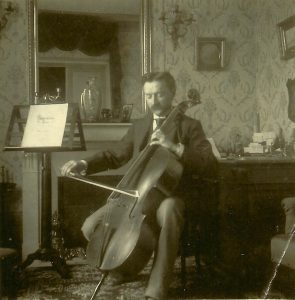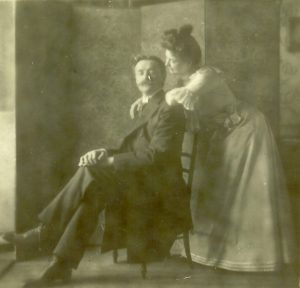
Leiden, September 3rd, 1858 – Fontainebleau (France), May 10th, 1904
Daniël van Goens began studying cello at an early age. When he was 14 years old, his parents decided to move to a more favourable climate with him, his sister and brother – the only three of eleven children to survive – in order to escape the constant threat of tuberculosis: first to Montpellier (1872), then to Lausanne (1873), but finally returning further north to Paris (1879).
It was here that van Goens decided to abandon his legal studies and to enrol at the Conservatoire. He studied cello with Léon Jacquard and composition with Albert Lavignac, graduating with highest distinction in 1883. He showed great promise as a cellist, and was expected to embark on a playing career; however, his poor state of health increasingly thwarted such hopes. He spent the winters in Menton or in the mountains of Wallis.
 As a composer van Goens was particularly drawn towards composing shorter works, which could be described as a distinguished type of salon music. Unsurprisingly, most of these works are for cello and piano. They were published by leading Parisian publishers such as Hamelle, Durand and Rouart. He also composed several orchestral works and two cello concertos: no.1 in A minor opus 7 (1886/87, published around 1899, à la mémoire du maître Léon Jacquard) and no.2 in D minor opus 30 (published around 1901, dedicated to David Popper). His last composition for cello and piano is the Berceuse opus 46, dedicated to his young daughter Gertrude, who was born of his marriage with the pianist Germaine Polack shortly before his death. His most popular composition is undoubtedly the Scherzo opus 12 no.2. The ‘van Goens Scherzo’ has become such a household name among cellists that no one actually ever stops to wonder who he was and where he came from.
As a composer van Goens was particularly drawn towards composing shorter works, which could be described as a distinguished type of salon music. Unsurprisingly, most of these works are for cello and piano. They were published by leading Parisian publishers such as Hamelle, Durand and Rouart. He also composed several orchestral works and two cello concertos: no.1 in A minor opus 7 (1886/87, published around 1899, à la mémoire du maître Léon Jacquard) and no.2 in D minor opus 30 (published around 1901, dedicated to David Popper). His last composition for cello and piano is the Berceuse opus 46, dedicated to his young daughter Gertrude, who was born of his marriage with the pianist Germaine Polack shortly before his death. His most popular composition is undoubtedly the Scherzo opus 12 no.2. The ‘van Goens Scherzo’ has become such a household name among cellists that no one actually ever stops to wonder who he was and where he came from.
A selection of his compositions:
Elégie opus 10 [1894]
Romance sans paroles et Scherzo opus 12 [1895]
Valse de Concert opus 23 [1895]
Invocation opus 36 (1900)
Valse pittoresque opus 38 [1904]
Berceuse opus 46 [1904]
